经典句子,段落,篇章的翻译
- 格式:doc
- 大小:38.50 KB
- 文档页数:1
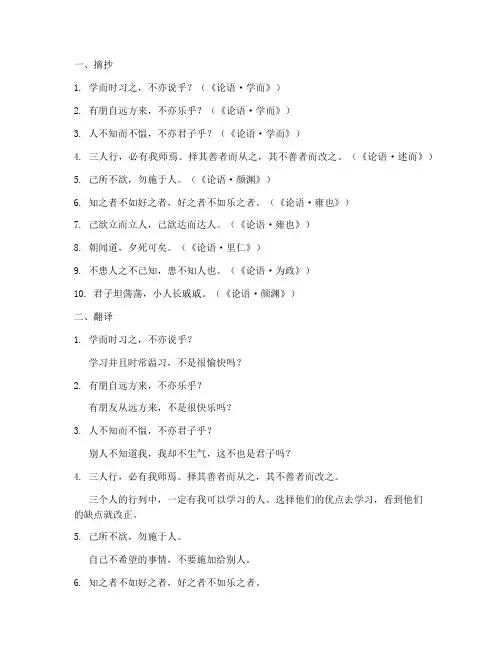
一、摘抄1. 学而时习之,不亦说乎?(《论语·学而》)2. 有朋自远方来,不亦乐乎?(《论语·学而》)3. 人不知而不愠,不亦君子乎?(《论语·学而》)4. 三人行,必有我师焉。
择其善者而从之,其不善者而改之。
(《论语·述而》)5. 己所不欲,勿施于人。
(《论语·颜渊》)6. 知之者不如好之者,好之者不如乐之者。
(《论语·雍也》)7. 己欲立而立人,己欲达而达人。
(《论语·雍也》)8. 朝闻道,夕死可矣。
(《论语·里仁》)9. 不患人之不己知,患不知人也。
(《论语·为政》)10. 君子坦荡荡,小人长戚戚。
(《论语·颜渊》)二、翻译1. 学而时习之,不亦说乎?学习并且时常温习,不是很愉快吗?2. 有朋自远方来,不亦乐乎?有朋友从远方来,不是很快乐吗?3. 人不知而不愠,不亦君子乎?别人不知道我,我却不生气,这不也是君子吗?4. 三人行,必有我师焉。
择其善者而从之,其不善者而改之。
三个人的行列中,一定有我可以学习的人。
选择他们的优点去学习,看到他们的缺点就改正。
5. 己所不欲,勿施于人。
自己不希望的事情,不要施加给别人。
6. 知之者不如好之者,好之者不如乐之者。
知道的人不如喜欢的人,喜欢的人不如乐于其中的人。
7. 己欲立而立人,己欲达而达人。
自己想要成功,也要帮助别人成功;自己想要通达,也要帮助别人通达。
8. 朝闻道,夕死可矣。
早上听到真理,晚上死去也值得。
9. 不患人之不己知,患不知人也。
不担心别人不了解自己,担心自己不了解别人。
10. 君子坦荡荡,小人长戚戚。
君子胸怀坦荡,小人则常常忧愁。
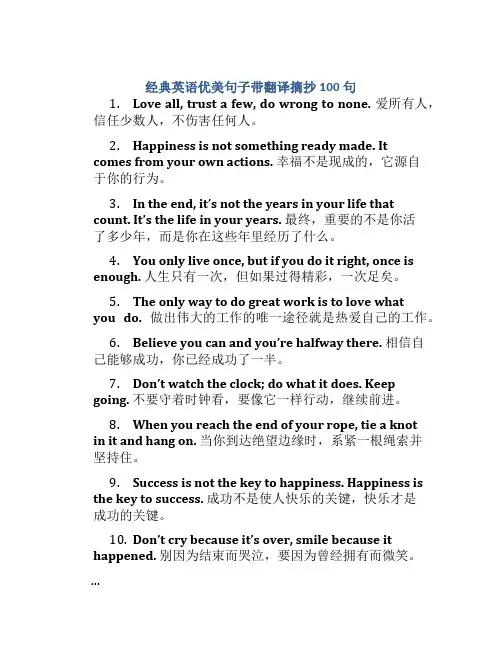
经典英语优美句子带翻译摘抄100句1.Love all, trust a few, do wrong to none.爱所有人,信任少数人,不伤害任何人。
2.Happiness is not something ready made. It comes from your own actions.幸福不是现成的,它源自于你的行为。
3.In the end, it’s not the years in your life that count. It’s the life in your years.最终,重要的不是你活了多少年,而是你在这些年里经历了什么。
4.You only live once, but if you do it right, once is enough.人生只有一次,但如果过得精彩,一次足矣。
5.The only way to do great work is to love whatyou do.做出伟大的工作的唯一途径就是热爱自己的工作。
6.Believe you can and you’re halfway there.相信自己能够成功,你已经成功了一半。
7.Don’t w atch the clock; do what it does. Keep going.不要守着时钟看,要像它一样行动,继续前进。
8.When you reach the end of your rope, tie a knotin it and hang on.当你到达绝望边缘时,系紧一根绳索并坚持住。
9.Success is not the key to happiness. Happiness is the key to success.成功不是使人快乐的关键,快乐才是成功的关键。
10.Don’t cry because it’s over, smile because it happened.别因为结束而哭泣,要因为曾经拥有而微笑。
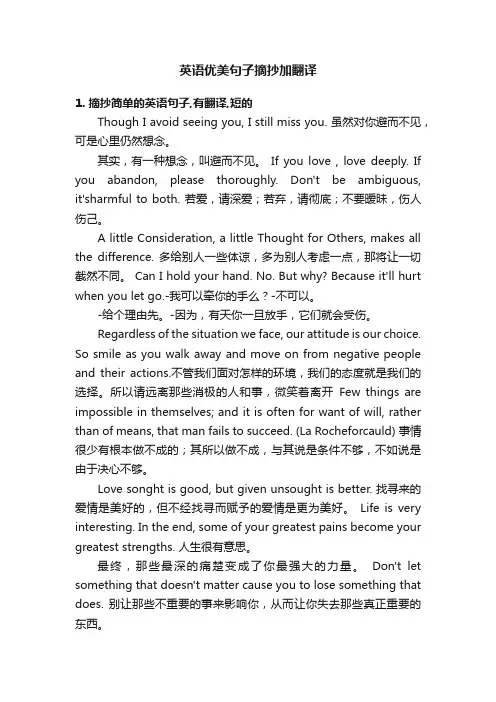
英语优美句子摘抄加翻译1. 摘抄简单的英语句子,有翻译,短的Though I avoid seeing you, I still miss you. 虽然对你避而不见,可是心里仍然想念。
其实,有一种想念,叫避而不见。
If you love , love deeply. If you abandon, please thoroughly. Don't be ambiguous, it'sharmful to both. 若爱,请深爱;若弃,请彻底;不要暧昧,伤人伤己。
A little Consideration, a little Thought for Others, makes all the difference. 多给别人一些体谅,多为别人考虑一点,那将让一切截然不同。
Can I hold your hand. No. But why? Because it'll hurt when you let go.-我可以牵你的手么?-不可以。
-给个理由先。
-因为,有天你一旦放手,它们就会受伤。
Regardless of the situation we face, our attitude is our choice. So smile as you walk away and move on from negative people and their actions.不管我们面对怎样的环境,我们的态度就是我们的选择。
所以请远离那些消极的人和事,微笑着离开Few things are impossible in themselves; and it is often for want of will, rather than of means, that man fails to succeed. (La Rocheforcauld) 事情很少有根本做不成的;其所以做不成,与其说是条件不够,不如说是由于决心不够。
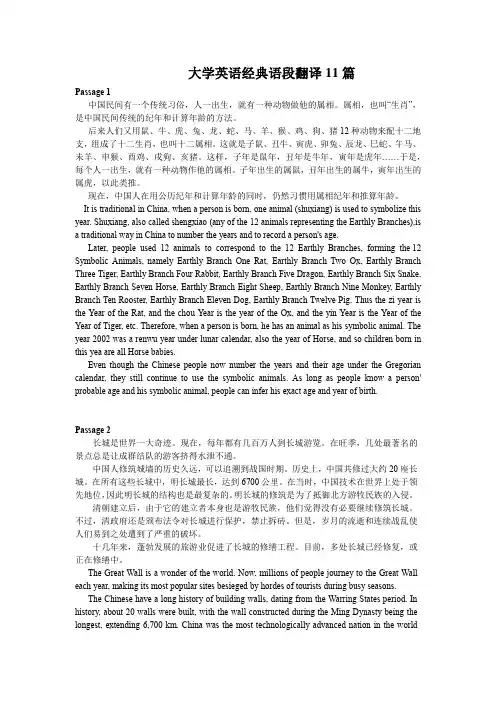
大学英语经典语段翻译11篇Passage 1中国民间有一个传统习俗,人一出生,就有一种动物做他的属相。
属相,也叫“生肖”,是中国民间传统的纪年和计算年龄的方法。
后来人们又用鼠、牛、虎、兔、龙、蛇、马、羊、猴、鸡、狗、猪12种动物来配十二地支,组成了十二生肖,也叫十二属相。
这就是子鼠、丑牛、寅虎、卯兔、辰龙、巳蛇、午马、未羊、申猴、酉鸡、戌狗、亥猪。
这样,子年是鼠年,丑年是牛年,寅年是虎年……于是,每个人一出生,就有一种动物作他的属相。
子年出生的属鼠,丑年出生的属牛,寅年出生的属虎,以此类推。
现在,中国人在用公历纪年和计算年龄的同时,仍然习惯用属相纪年和推算年龄。
It is traditional in China, when a person is born, one animal (shuxiang) is used to symbolize this year. Shuxiang, also called shengxiao (any of the 12 animals representing the Earthly Branches),is a traditional way in China to number the years and to record a person's age.Later, people used 12 animals to correspond to the 12 Earthly Branches, forming the 12 Symbolic Animals, namely Earthly Branch One Rat, Earthly Branch Two Ox, Earthly Branch Three Tiger, Earthly Branch Four Rabbit, Earthly Branch Five Dragon, Earthly Branch Six Snake, Earthly Branch Seven Horse, Earthly Branch Eight Sheep, Earthly Branch Nine Monkey, Earthly Branch Ten Rooster, Earthly Branch Eleven Dog, Earthly Branch Twelve Pig. Thus the zi year is the Year of the Rat, and the chou Year is the year of the Ox, and the yin Year is the Year of the Year of Tiger, etc. Therefore, when a person is born, he has an animal as his symbolic animal. The year 2002 was a renwu year under lunar calendar, also the year of Horse, and so children born in this yea are all Horse babies.Even though the Chinese people now number the years and their age under the Gregorian calendar, they still continue to use the symbolic animals. As long as people know a person' probable age and his symbolic animal, people can infer his exact age and year of birth.Passage 2长城是世界一大奇迹。
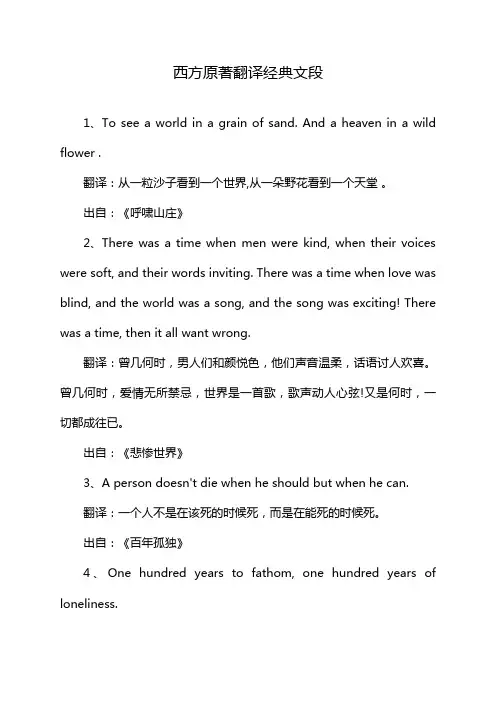
西方原著翻译经典文段1、To see a world in a grain of sand. And a heaven in a wild flower .翻译:从一粒沙子看到一个世界,从一朵野花看到一个天堂。
出自:《呼啸山庄》2、There was a time when men were kind, when their voices were soft, and their words inviting. There was a time when love was blind, and the world was a song, and the song was exciting! There was a time, then it all want wrong.翻译:曾几何时,男人们和颜悦色,他们声音温柔,话语讨人欢喜。
曾几何时,爱情无所禁忌,世界是一首歌,歌声动人心弦!又是何时,一切都成往已。
出自:《悲惨世界》3、A person doesn't die when he should but when he can.翻译:一个人不是在该死的时候死,而是在能死的时候死。
出自:《百年孤独》4、One hundred years to fathom, one hundred years of loneliness.翻译:百年一参透,百年一孤独。
出自:《百年孤独》5、God wills it that man whom he has created, and in whose heart he has so profoundly rooted the lore of life, should do all in his power to preserve that existence, which however painful it may be, is yet always so dear.翻译:上帝创造了人,并在他的心中根深蒂固地植入了对生命的爱,不论是多么痛苦,可总还是觉得它是可爱的,上帝既然这样创造了人,他总会尽力使他存在的。
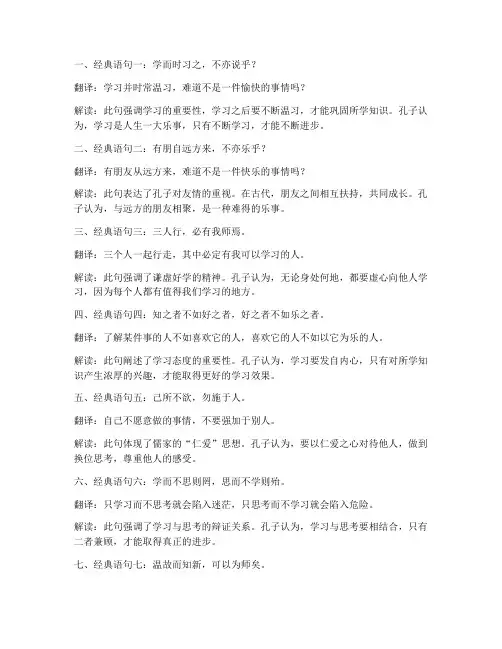
一、经典语句一:学而时习之,不亦说乎?翻译:学习并时常温习,难道不是一件愉快的事情吗?解读:此句强调学习的重要性,学习之后要不断温习,才能巩固所学知识。
孔子认为,学习是人生一大乐事,只有不断学习,才能不断进步。
二、经典语句二:有朋自远方来,不亦乐乎?翻译:有朋友从远方来,难道不是一件快乐的事情吗?解读:此句表达了孔子对友情的重视。
在古代,朋友之间相互扶持,共同成长。
孔子认为,与远方的朋友相聚,是一种难得的乐事。
三、经典语句三:三人行,必有我师焉。
翻译:三个人一起行走,其中必定有我可以学习的人。
解读:此句强调了谦虚好学的精神。
孔子认为,无论身处何地,都要虚心向他人学习,因为每个人都有值得我们学习的地方。
四、经典语句四:知之者不如好之者,好之者不如乐之者。
翻译:了解某件事的人不如喜欢它的人,喜欢它的人不如以它为乐的人。
解读:此句阐述了学习态度的重要性。
孔子认为,学习要发自内心,只有对所学知识产生浓厚的兴趣,才能取得更好的学习效果。
五、经典语句五:己所不欲,勿施于人。
翻译:自己不愿意做的事情,不要强加于别人。
解读:此句体现了儒家的“仁爱”思想。
孔子认为,要以仁爱之心对待他人,做到换位思考,尊重他人的感受。
六、经典语句六:学而不思则罔,思而不学则殆。
翻译:只学习而不思考就会陷入迷茫,只思考而不学习就会陷入危险。
解读:此句强调了学习与思考的辩证关系。
孔子认为,学习与思考要相结合,只有二者兼顾,才能取得真正的进步。
七、经典语句七:温故而知新,可以为师矣。
翻译:温习旧知识,从而获得新的认识,这样就可以成为别人的老师了。
解读:此句强调了温故知新的重要性。
孔子认为,通过温习旧知识,可以加深对知识的理解,提高自己的素养,从而成为他人的榜样。
总之,《论语》中的经典语句蕴含着丰富的哲理,对于我们今天的生活和工作仍有重要的指导意义。
通过学习和理解这些语句,我们可以更好地认识自己、认识他人,从而提升自己的道德修养和人生境界。
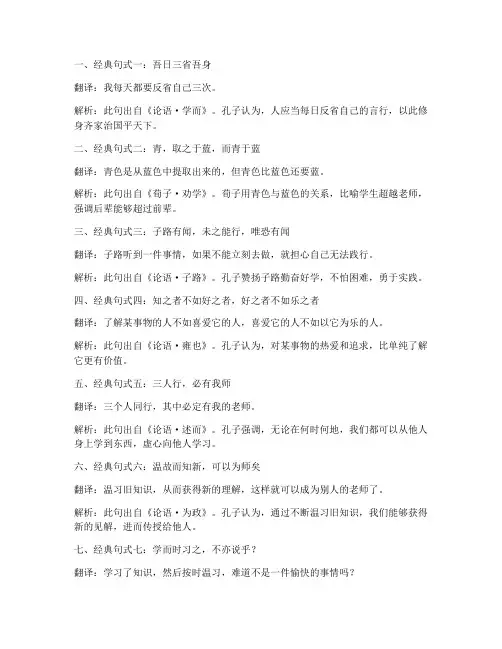
一、经典句式一:吾日三省吾身翻译:我每天都要反省自己三次。
解析:此句出自《论语·学而》。
孔子认为,人应当每日反省自己的言行,以此修身齐家治国平天下。
二、经典句式二:青,取之于蓝,而青于蓝翻译:青色是从蓝色中提取出来的,但青色比蓝色还要蓝。
解析:此句出自《荀子·劝学》。
荀子用青色与蓝色的关系,比喻学生超越老师,强调后辈能够超过前辈。
三、经典句式三:子路有闻,未之能行,唯恐有闻翻译:子路听到一件事情,如果不能立刻去做,就担心自己无法践行。
解析:此句出自《论语·子路》。
孔子赞扬子路勤奋好学,不怕困难,勇于实践。
四、经典句式四:知之者不如好之者,好之者不如乐之者翻译:了解某事物的人不如喜爱它的人,喜爱它的人不如以它为乐的人。
解析:此句出自《论语·雍也》。
孔子认为,对某事物的热爱和追求,比单纯了解它更有价值。
五、经典句式五:三人行,必有我师翻译:三个人同行,其中必定有我的老师。
解析:此句出自《论语·述而》。
孔子强调,无论在何时何地,我们都可以从他人身上学到东西,虚心向他人学习。
六、经典句式六:温故而知新,可以为师矣翻译:温习旧知识,从而获得新的理解,这样就可以成为别人的老师了。
解析:此句出自《论语·为政》。
孔子认为,通过不断温习旧知识,我们能够获得新的见解,进而传授给他人。
七、经典句式七:学而时习之,不亦说乎?翻译:学习了知识,然后按时温习,难道不是一件愉快的事情吗?解析:此句出自《论语·学而》。
孔子强调学习的重要性,认为按时温习所学知识,是一种快乐。
总结:以上七则文言文经典句式,蕴含着丰富的哲理和人生智慧。
通过对这些句式的翻译,我们不仅可以领略古代文化的魅力,还可以从中汲取营养,为我们的学习和生活提供启示。
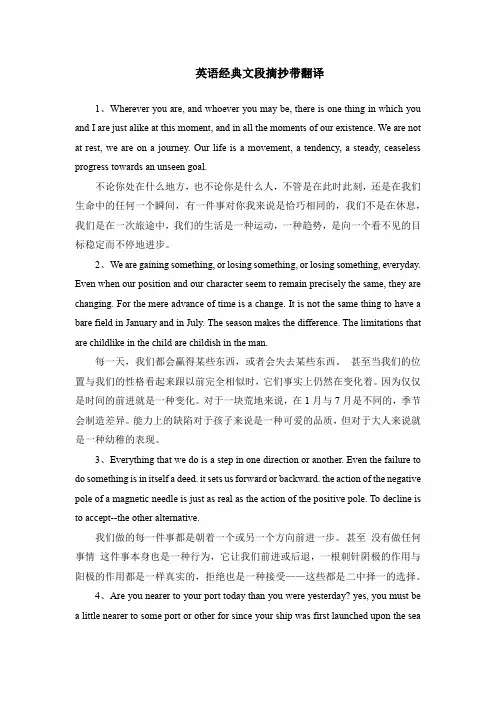
英语经典文段摘抄带翻译1、Wherever you are, and whoever you may be, there is one thing in which you and I are just alike at this moment, and in all the moments of our existence. We are not at rest, we are on a journey. Our life is a movement, a tendency, a steady, ceaseless progress towards an unseen goal.不论你处在什么地方,也不论你是什么人,不管是在此时此刻,还是在我们生命中的任何一个瞬间,有一件事对你我来说是恰巧相同的,我们不是在休息,我们是在一次旅途中,我们的生活是一种运动,一种趋势,是向一个看不见的目标稳定而不停地进步。
2、We are gaining something, or losing something, or losing something, everyday. Even when our position and our character seem to remain precisely the same, they are changing. For the mere advance of time is a change. It is not the same thing to have a bare field in January and in July. The season makes the difference. The limitations that are childlike in the child are childish in the man.每一天,我们都会赢得某些东西,或者会失去某些东西。
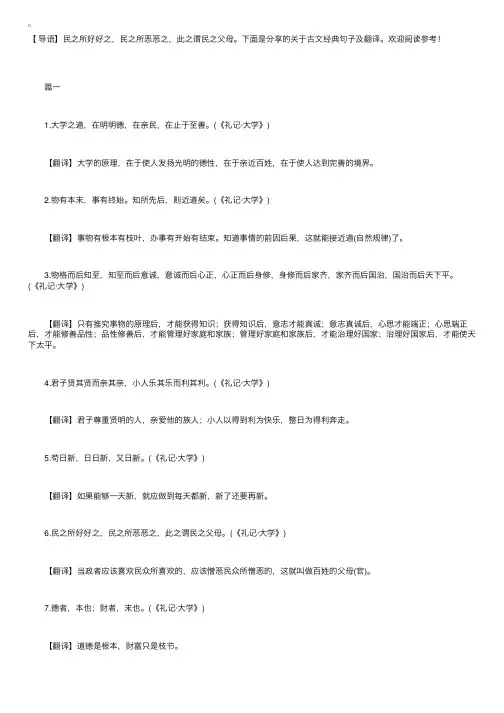
【导语】民之所好好之,民之所恶恶之,此之谓民之⽗母。
下⾯是分享的关于古⽂经典句⼦及翻译。
欢迎阅读参考! 篇⼀ 1.⼤学之道,在明明德,在亲民,在⽌于⾄善。
(《礼记·⼤学》) 【翻译】⼤学的原理,在于使⼈发扬光明的德性,在于亲近百姓,在于使⼈达到完善的境界。
2.物有本末,事有终始。
知所先后,则近道矣。
(《礼记·⼤学》) 【翻译】事物有根本有枝叶,办事有开始有结束。
知道事情的前因后果,这就能接近道(⾃然规律)了。
3.物格⽽后知⾄,知⾄⽽后意诚,意诚⽽后⼼正,⼼正⽽后⾝修,⾝修⽽后家齐,家齐⽽后国治,国治⽽后天下平。
(《礼记·⼤学》) 【翻译】只有推究事物的原理后,才能获得知识;获得知识后,意志才能真诚;意志真诚后,⼼思才能端正;⼼思端正后,才能修善品性;品性修善后,才能管理好家庭和家族;管理好家庭和家族后,才能治理好国家;治理好国家后,才能使天下太平。
4.君⼦贤其贤⽽亲其亲,⼩⼈乐其乐⽽利其利。
(《礼记·⼤学》) 【翻译】君⼦尊重贤明的⼈,亲爱他的族⼈;⼩⼈以得到利为快乐,整⽇为得利奔⾛。
5.苟⽇新,⽇⽇新,⼜⽇新。
(《礼记·⼤学》) 【翻译】如果能够⼀天新,就应做到每天都新,新了还要再新。
6.民之所好好之,民之所恶恶之,此之谓民之⽗母。
(《礼记·⼤学》) 【翻译】当政者应该喜欢民众所喜欢的,应该憎恶民众所憎恶的,这就叫做百姓的⽗母(官)。
7.德者,本也;财者,末也。
(《礼记·⼤学》) 【翻译】道德是根本,财富只是枝节。
8.所谓诚其意者,⽏⾃欺也。
(《礼记·⼤学》) 【翻译】所谓诚实⾃⼰的意念,就是说不要⾃⼰欺骗⾃⼰。
9.⽣财有⼤道。
⽣之者众,⾷之者寡,为之者疾,⽤之者舒,则财恒⾜矣。
(《礼记·⼤学》) 【翻译】积聚财富有⼀定的道理。
⽣产的⼈要多,消费的⼈要少,创造财富要迅速,使⽤财富要缓慢。
这样,国家的财富就会经常保持充裕了。
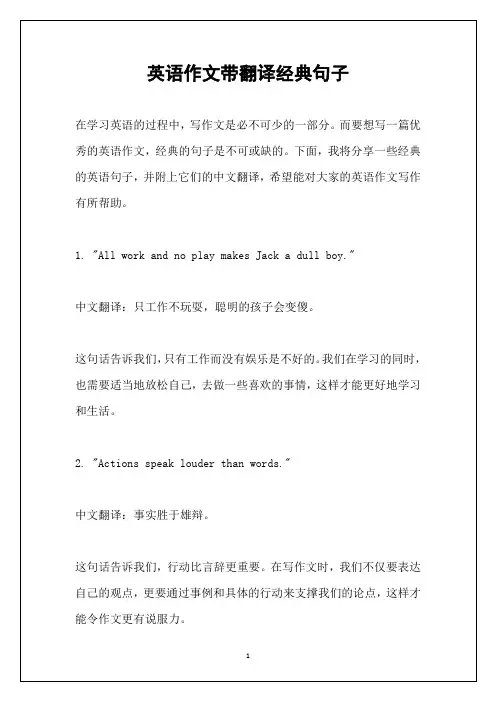
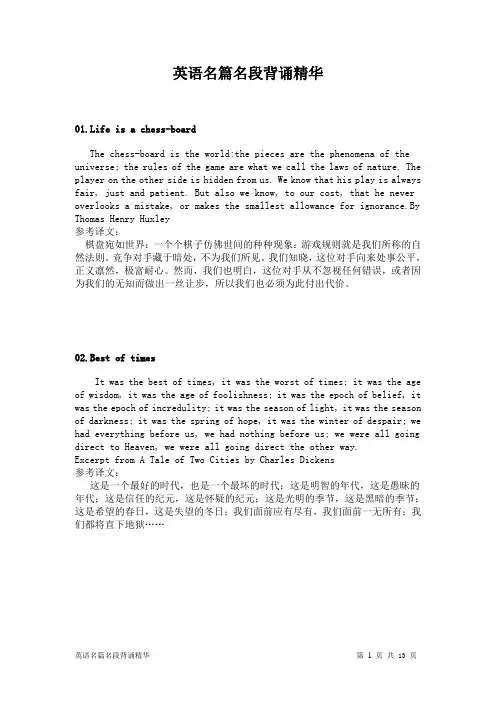
英语名篇名段背诵精华01.Life is a chess-boardThe chess-board is the world:the pieces are the phenomena of the universe; the rules of the game are what we call the laws of nature. The player on the other side is hidden from us. We know that his play is always fair, just and patient. But also we know, to our cost, that he never overlooks a mistake, or makes the smallest allowance for ignorance.By Thomas Henry Huxley参考译文:棋盘宛如世界:一个个棋子仿佛世间的种种现象:游戏规则就是我们所称的自然法则。
竞争对手藏于暗处,不为我们所见。
我们知晓,这位对手向来处事公平,正义凛然,极富耐心。
然而,我们也明白,这位对手从不忽视任何错误,或者因为我们的无知而做出一丝让步,所以我们也必须为此付出代价。
02.Best of timesIt was the best of times, it was the worst of times; it was the age of wisdom, it was the age of foolishness; it was the epoch of belief, it was the epoch of incredulity; it was the season of light, it was the season of darkness; it was the spring of hope, it was the winter of despair; we had everything before us, we had nothing before us; we were all going direct to Heaven, we were all going direct the other way.Excerpt from A Tale of Two Cities by Charles Dickens参考译文:这是一个最好的时代,也是一个最坏的时代;这是明智的年代,这是愚昧的年代;这是信任的纪元,这是怀疑的纪元;这是光明的季节,这是黑暗的季节;这是希望的春日,这是失望的冬日;我们面前应有尽有,我们面前一无所有;我们都将直下地狱……03.Equality and greatnessBetween persons of equal income there is no social distinction except the distinction of merit. Money is nothing;character,conduct,and capacity are everything.Instead of all the workers being leveled down to low wage standards and all the rich leveled up to fashionbale income standards,everybody under a system of equal incomes would find his or her own natural level.There would be great people and ordinary people and little peolpe,but the great would always be those who had done great things,and never the idiot whose mother had spoiled them and whose father had left a hunred thousand a year;and the little would be persons of small minds and mean characters,and not poor persons who had never had a chance.That is why idiots are always in favour of inequality of income(their only chance of eminence),and the really great in favour of equality.收入相当的人除了品性迥异以外没有社会差别。
英语经典句子带翻译英语经典句子带翻译大全在学习、工作或生活中,许多人都接触过一些比较经典的句子吧,句子是能够表达一个相对完整的意思,有一定的语调,表示不同的语气,句未有一个较大停顿的语言单位。
你知道什么样的句子才能称之为经典吗?以下是小编为大家整理的英语经典句子带翻译大全,欢迎大家借鉴与参考,希望对大家有所帮助。
英语经典句子带翻译11:every day i miss you. it is a hard time for me to miss you but it is even harder not to do so. in such a contrary mood, i miss you deeply!在每个想念的日子,想你不容易,不想你更难,愿以一片难懂的心情,深深思念你!2:when love is not madness, it is not love. 如果爱不疯狂就不是爱了。
3:老师,您是美的耕耘者,美的播种者。
是您用美的阳光普照,用美的雨露滋润,我们的心田才绿草如茵,繁花似锦!4:shadow, with her veil drawn, follows light in secret meekness, with her silent steps of love. 阴影戴上她的面幕,秘密地,温顺地,用她的沉默的爱的脚步,跟在“光”后边。
5:for attractive lips, speak words of kindness.若要优美的嘴唇,要说友善的话。
6:不要因为结束而哭泣,微笑吧,为你的曾经拥有。
don’t cry because it is over, smile because it happened.7:拥有感恩的心,你会感谢善良的人们给予你的每一份善意,无论相识不相识。
8:the shortest answer is doing.最简单的回答就是干。
9:no words are necessary between two loving hearts. 两颗相爱的心之间不需要言语10:lichou away gradually, such as at continuously infinite.离愁渐远渐无穷,迢迢不断如春水。
段落翻译(原文+译文)1. 参与并取胜,这就是奥林匹克精神。
他表现于弱者敢于向强者挑战,也表现于强者力争取得更好的成绩。
胜而又胜,优而更优,这种理想一直鼓舞着运动员奋力前进。
他会尽其所能,争取优胜,永不松懈,永不罢休。
有人说竞技者终究逃脱不了失败,即使是最佳运动员也会被更强者所淘汰——这就是竞技运动的规律。
然而运动员却从不为这种不可避免的失败而气馁,仍然奋力拼搏争取最佳发挥。
并对自己在奥林匹克运动中为争取更好成绩已尽了一份力而心满意足。
他会自豪地说他的青春没有虚度。
(221字)【参考译文】To participate and win — that is the Olympic spirit. It finds expression in the weak daring to defy the strong, and the strong striving for ever better performance. “Ever better” — the ideal is always luring a sportsman forward. He will do everything he can for it, never relax, never give up. It is said that none of the competitors can avoid being defeated — even the best is to be surpassed by someone still stronger. This is rule of sports. However, undaunted by the inevitable failure, the sportsman is always striving to do the best he can and content with the fact that he has done his bit for the “ever better” records in the Olympic Games. He will say proudly that he has not lived his youth in vain.2. 中国,一个值得自豪的文明古国,大约有5000年悠久和神秘的历史。
汉译英段落1:中国民族自古以来从不把人看作高于一切,在哲学文艺方面的表现都反映出人在自然界中与万物占有比例较为恰当的地位,而非绝对统治万物的主宰。
因此我们的苦闷基本上比西方人为少为小:因为苦闷的强弱原是随欲望与野心的大小而转移的。
农业社会的人比工业社会的人享受差得多,因此欲望也小的多。
何况中国古代素来以不怠于物不为物役为最主要的人生哲学。
汉译英段落2:暮色中,河湾里落满云霞,与天际的颜色混合一起,分不清哪是流云哪是水湾。
也就在这一幅绚烂的图画旁边,在河湾之畔,一群羊正在低头觅食。
它们几乎没有一个顾得上抬起头来,看一眼这美丽的黄昏。
也许它们要抓紧时间,在即将回家的最后一刻再次咀嚼。
这是黄河滩上的一幕。
牧羊人不见了,他不知在何处歇息。
只有这些美生灵自由自在地享受着这个黄昏。
这儿水草肥美,让它们长得肥滚滚的,像些胖娃娃。
如果走近了,会发现它们那可爱的神情,洁白的牙齿,那丰富而单纯的表情。
如果稍稍长久一点端详这张张面庞,还会生出无限的怜悯。
汉译英段落3(翻译划线部分):都市寸土千金,地价炒得越来越高,今后将更高。
拥有一个小小花园的希望,对寻常之辈不啻是一种奢望,一种梦想。
我想,其实谁都有一个小小花园,这便是我们的内心世界。
人的智力需要开发,人的内心世界也是需要开发的。
人和动物的区别,除了众所周知的诸多方面,恐怕还在于人有内心世界。
心不过是人的一个重要脏器,而内心世界是一种景观,它是由外部世界不断地作用于内心渐渐形成的。
每个人都无比关注自己及至亲至爱之人心脏的渐损,以至于稍有微疾便惶惶不可终日。
但并非每个人都关注自己及至亲至爱之人的内心世界的阴晴。
汉译英段落4(翻译划线部分):我想不起来哪一个熟人没有手机。
今天没有手机的人是奇怪的,这种人才需要解释。
我们的所有社会关系都储存在手机的电话本里,可以随时调出使用。
古代只有巫师才能拥有这种法宝。
手机刷新了人与人的关系。
会议室门口通常贴着一条通告:请与会者关闭手机。
1. 那是个正规宴会,我照妈妈对我讲的那样穿着礼服去了。
(formal)As it was a formal dinner party, I wore formal dress, as mother told me to.2. 他的女友劝他趁抽烟的坏习惯尚未根深蒂固之前把它改掉(take hold)His girlfriend advised him to get rid of his bad habit of smoking before it took hold.3. 他们预料到下几个月电的需求量很大,决定增加生产.(anticipate)Anticipating that the demand for electricity will be high during the next few months, they ha ve decided to increase its production.4. 据说比尔一再违反公司的安全规章而被解雇。
(violate)It is said that Bill has been fired for continually violating the company’s safety rule.5. 据报道地方政府已采取适当措施避免严重缺水(water shortage)的可能性。
(avoid,severe) The local government is reported to have taken proper measures to avoid the possibility of a severe water shortage.Unit1 篇章翻译苏珊因车祸失去了双腿Susan lost her legs because of a car accident.。
有一段时间,她真不知如何面对自己再也不能行走的事实For a time, she didn't know how to face up to the fact that she would never walk again一天,苏珊在浏览书籍时,被一个真实的故事吸引住了。
一、原文:
【原文】“天下兴亡,匹夫有责。
”
【翻译】天下兴衰,每个普通人都负有责任。
二、原文:
【原文】“天下之至柔,驰骋天下之至坚。
”
【翻译】天下最柔弱的东西,能够在天下最坚硬的东西上驰骋。
三、原文:
【原文】“水至清则无鱼,人至察则无徒。
”
【翻译】水太清澈就没有鱼,人太精明就没有伙伴。
四、原文:
【原文】“天下大事,必作于细。
”
【翻译】天下的大事,必定是从细节开始的。
五、原文:
【原文】“夫轻诺必寡信,多易必多难。
”
【翻译】轻易许下的诺言必定很少能够兑现,事情容易必定会有更多的困难。
六、原文:
【原文】“天下之至诚,可以感无神。
”
【翻译】天下最真诚的心,可以感动无神的存在。
七、原文:
【原文】“人固有一死,或重于泰山,或轻于鸿毛。
”
【翻译】人固然都会死去,有的人的死重于泰山,有的人的死轻于鸿毛。
八、原文:
【原文】“天行健,君子以自强不息。
”
【翻译】天的运行刚健,君子应该自强不息。
九、原文:
【原文】“天下兴亡,匹夫有责。
国破家亡,仁人志士为之痛心疾首。
”
【翻译】天下兴衰,每个普通人都负有责任。
国家破灭,家道中落,仁人志士对此感到痛心疾首。
十、原文:
【原文】“民为邦本,本固邦宁。
”
【翻译】人民是国家的根本,根本稳固,国家才能安宁。
以上是《资治通鉴》书摘的文言文翻译,共计约500字。
希望对您有所帮助。
1.窗前有棵老榆树,榆树正密,一串串在枝上开着,有几枝刚出巢的蜜蜂,围着榆树乱飞,不住的嗡嗡的叫着An old elm beforethe house was hung with thickclusters of seeds and somebees just out of the hive wereflying round it, keeping up acontinuous hum.2.These skills used to be handeddown from father to son.3.T he people is to the people’sarmy what water is to fish.4.The telephone operator cut usoff before we had finishedour conversation.5.To a person cherishing hopesevery morning rises a new sun.Even if it is a fantasy or anillusion, so it shows a ray ofhope it still urges you on inpursuit of that little sparklewithout letup.6. 幽默是智慧、学识、机敏的结晶,幽默在我们社会、家庭、工作、学习、生活中不可或缺。
Humor is the crystallization of wit, knowledge, and resourcefulness. It is also indispensable to our work, study , family ,society ,and life in general.7.The experts believed that theepidemic disease was causedby either air pollution or foodcontamination.1.气候变化是人类发展进程中出现的问题,既受自然因素影响,也受人类活动影响,既是环境问题,更是发展问题,同各国发展阶段、生活方式、人口规模、资源禀赋以及国际产业分工等因素密切相关。
Climate change is an issue arising in the course of human development. It is associated with both natural factors and human activities. It is an environmental issue, but also, and more importantly, a development issue, as it is closely connected with the development stage, way of life, size of population and resource endowment of different countriesand their places in the internationaldivision of labor.2.志愿者活动近年来,志愿活动更加流行,尤其是在北京奥运会之后。
有些人志愿协助大型会议或集会,有些人在非政府组织中做志愿者,也有一些人定期志愿参与社区工作。
这一切活动使社会产生了深远的变化,使我们的社会更加美好。
首先,志愿者们为建立一个更公平的社会做出了巨大贡献。
大多数志愿者都有自己的工作或者学习任务,但是他们愿意放弃自己的休息时间去帮助弱势群体。
这不仅帮助纾解了民困,消除了贫富差距,也为迫切需要帮助的人们送去了关爱。
其次,志愿者活动的普遍开展有助于我们建立和谐社会。
人们学会算计少一些,要求少一些,而贡献多一些,这对维持社会稳定来说是件好事。
作为当代大学生,我们承担着改善社会状况的责任。
为社会做更多的贡献,帮助需要帮助的人是我们与生俱来的责任。
因此,每个人都应当参与志愿者活动.(词汇: 集会gathering紧急的urgent社区community 和谐的harmonious 深远的profound与生俱来的intrinsic)Volunteering ActivitiesIn recent years, volunteeringactivities have become even morepopular, especially after BeijingOlympic Games. Some peoplevolunteer to assist large-scaleconferences and gathering; somevolunteer in non-governmentalorganizations, and some volunteerin community work regularly.All of these activities havebrought profound changes to oursociety and made it a better place.To begin with, volunteerscontribute significantly to build afairer society. Most volunteershave already had their jobs orlearning tasks, but they are willingto give up their rest hours to helpdisadvantaged people. It helps torelease people’s grief, bridge thegap between the wealthy and theneedy and bring love and care topeople who are in urgent need. Inthe second place, the prevalence ofvolunteer activities helps to build aharmonious society. People learn tocalculate less, demand less butoffer more, which is a good sign formaintaining social stability.As contemporary collegestudents, we shoulder theresponsibility of improving thesociety. It is our intrinsic duty tomake more contribution to thesociety and give our hands to peoplewho are in need. Therefore,participating in volunteeringactivities s hould be on everyone’sschedule3.《汉书》中有这么个故事:有个富人,很喜欢古董并收藏了很多.其中有一件稀有的玉盂,工艺精湛,具有很高的历史价值,深受这个富人的喜爱.一天晚上,一只老鼠跳进了这个玉盂,想去吃里边的一些剩菜,正巧被这个富人看到了.他非常恼火,盛怒之下,他拿了块石头砸向老鼠.当然,老鼠是被砸死了,可是那个珍贵的玉盂也被打破了.这件事使富人非常难过,他深深后悔自己的鲁莽带来的不可挽回的损失.他认识到只考虑眼前,而忽视后果,将给自己带来灾难.他向世人发出警告,不要为了除掉一只老鼠而烧毁自己的房子.Do not burn your house to get rid ofa mouseThere is a story in "Hanshu" tellingof a rich man, who being a lover of sand had a large collection. Amongthem was a rare vase made of jade.The vase of exquisite workmanshipand of historical value and he lovedit dearly. One night he noticed amouse passing near the preciousvase. The mouse jumped into thevase and was trying to eat somefood which the man had carelesslyleft there. The sigh infuriated theman and in a fit of rage he threw astone at the mouse. For sure, themouse was killed, but the preciousvase was broken also. The loss ofthe vase pained the man greatly andhe deeply regretted his ownthoughtlessness, which bought himthis unrecoverable loss. He nowrealized that any one, who caresfor the present and overlooksconsequences, is apt to bringdisasters upon himself. So heexclaimed to warn people by sayingdo not burn you house to get rid ofa mouse.。